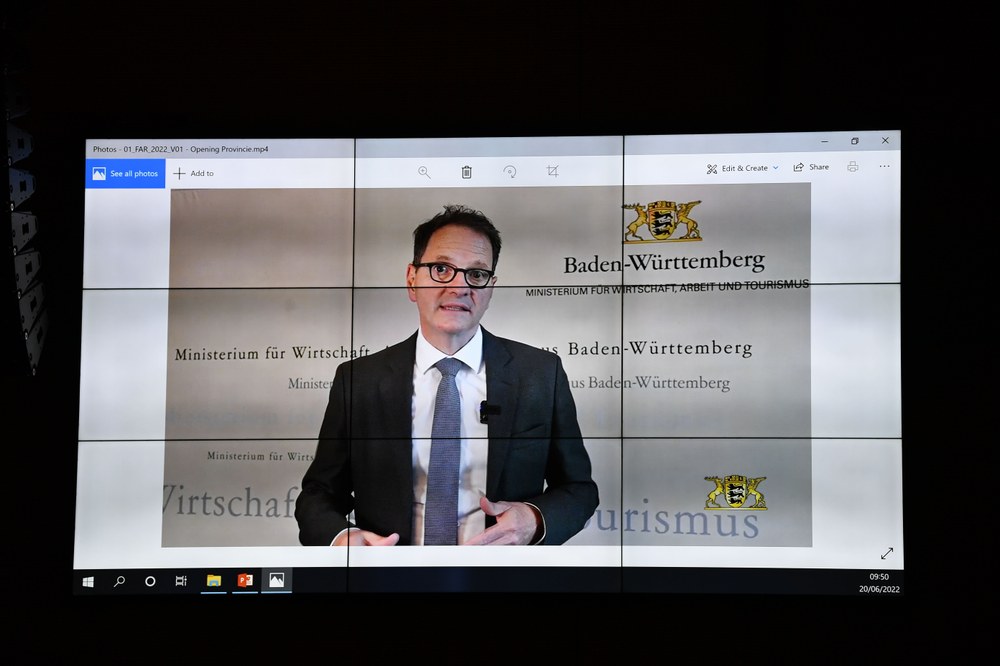Specialist conference showcases the spacecraft and propulsion systems of tomorrow


- From 19 to 23 June 2022, around 300 experts from research institutes, space agencies and industry gathered in Heilbronn, Germany, to exchange information on the development, construction and use of spacecraft for suborbital, orbital and exploration applications.
- The focus was on sustainable spaceflight, development of spacecraft and their propulsion systems, reusability and future space missions.
- During a visit to DLR's Lampoldshausen site, the Institute of Space Propulsion presented exciting and innovative technologies and projects that will make spaceflight more efficient, cost-effective, safe and sustainable.
- Focus: Spaceflight, space propulsion
From 19 to 23 June 2022, around 300 international experts from research institutes, space agencies and industry gathered at the '2nd International Conference on Flight Vehicles, Aerothermodynamics and Re-entry Missions and Engineering' or FAR 2022 conference in Heilbronn, Germany. The main topic of discussion was 'Sustainable space, the keystone to the future'. Sustainability is becoming increasingly important in space transport, space missions, and the space industry as a whole, as well as in the use of resources on other celestial bodies – particularly in view of the sharp increase in space activities by private entities.
Peter Gräf, Director of Applications and Science at the German Space Agency at DLR, emphasised in his welcome speech that: "Sustainability is one of the megatrends of our time. The space sector is also addressing this challenge. We are therefore very pleased that this year the FAR conference is taking place in Germany, for the first time. It offers representatives from research institutes, industry and space agencies the opportunity to work on interdisciplinary approaches to solutions for the future."
Contributions at the conference dealt, for example, with forward-looking technologies and solutions for the development of spacecraft and their propulsion systems. Other presentations were devoted to the architecture of space transport and exploration vehicles, flight physics, aerodynamics and thermodynamics, and future space missions. The conference was organised by the European Space Agency (ESA) together with other space agencies and numerous institutional partners. These included the DLR's Lampoldshausen-based Institute of Space Propulsion. As an accompanying programme, DLR is making it possible to visit the test facilities for liquid chemical propulsion systems for space applications at the Lampoldshausen site.
"The aerospace sector is facing structural challenges. However, we in Baden-Württemberg are sure that these challenges can also hold enormous opportunities for the space sector in our state. Our aerospace companies are embedded in an excellent research infrastructure with close ties to industry – a network that includes, for example, DLR and institutions of the Fraunhofer Society and the Baden-Württemberg Innovation Alliance. All of this shows that Baden-Württemberg is the 'place to be' when it comes to aerospace," said Michael Kleiner, Ministerial Director in the Baden-Württemberg Ministry for Economic Affairs, Labour and Tourism.
DLR research for advanced and reusable propulsion systems
The researchers at the DLR Institute of Space Propulsion are working to make tomorrow's spaceflight more efficient, more cost effective and safer with innovative and environmentally friendly fuels and propulsion systems. In numerous lectures, they presented the latest results of their work on liquid methane / liquid oxygen engines, satellite propulsion systems based on ionic liquids, hybrid rocket propulsion systems and the development of new propulsion concepts with the help of artificial intelligence (AI).
"More than ever, we are faced with the task of combining our expertise, our research capabilities and our unique infrastructure to advance the development of future-proof engine architectures and launcher generations that can be successful in the long term. Our common goal is to incorporate research results quickly and directly into the development of new propulsion concepts. Efficient science- and industry-oriented cooperation is playing an increasingly important role here," said Stefan Schlechtriem, Director of the DLR Institute of Space Propulsion, in his welcoming address to the international guests. Helmut Ciezki, co-organiser of the FAR conference and coordinator for advanced propellants and propulsion systems at the DLR Institute of Space Propulsion emphasised in his keynote speech: "An increasingly complex world, the protection of the environment and the rapid increase in space activity requires sustainability in space transportation, space missions, the space industry as a whole, as well as the use of resources on other celestial bodies."
Methane / oxygen rocket engines have the potential to make launches into space significantly less expensive. Liquid methane is not as cold as liquid hydrogen, so the cooling systems and fuelling equipment required are less expensive and fewer materials that can withstand extreme temperatures are needed. The use of ionic liquids, highly concentrated hydrogen peroxide, and other novel substances, such as nitrous oxide-based cooled fuel / oxidiser mixtures, opens up the possibility of replacing the harmful hydrazine-based compounds currently used in satellite propulsion systems. For example, when looking at the engine thrust produced per amount of fuel used, most of these alternatives offer better performance. Paraffins similar to candlewax can improve the performance and design of novel hybrid rocket engines to the point where they are being used by the space industry and start-ups to develop launchers for small satellites.
Research teams at DLR are developing advanced propellants and investigating the processes in rocket combustion chambers. The key for success is the optimal interaction of all components in a rocket engine – from the combustion chamber to the turbopumps to the valves. For this, DLR also relies on AI methods. Artificial intelligence helps to optimise the design of rocket engines, to better understand processes in the combustion chambers and to make the operation of test facilities more efficient. With this expertise, the DLR research team supports the German and European space industry in the development of innovative and economical rocket propulsion systems.
